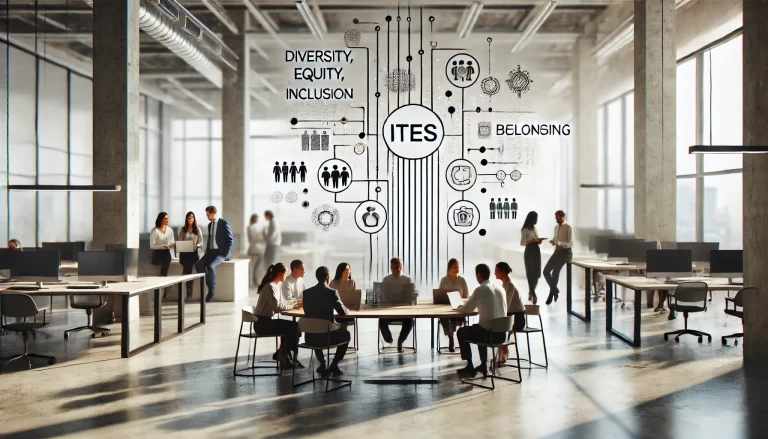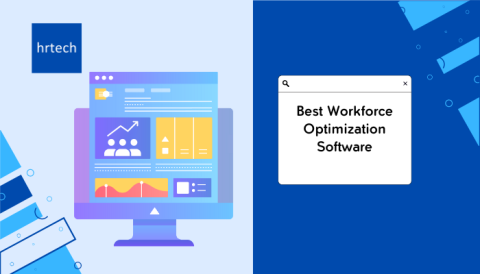The ITES (Information Technology Enabled Services) sector thrives on a global talent pool, bringing together individuals from diverse backgrounds and cultures. While this diversity is a significant strength, it also presents unique challenges. Cultural misunderstandings, unconscious biases, and unequal opportunities can create divisions within teams, hinder collaboration, and ultimately impact an organization’s success.
Many ITES organizations struggle to effectively embed Diversity, Equity, Inclusion, and Belonging (DEIB) practices across their global workforce. This can lead to decreased employee engagement, reduced innovation, and increased turnover. Brainayan‘s behavioral training empowers leaders with the skills and strategies needed to build inclusive workplaces that foster collaboration, enhance employee engagement, and drive business growth.
To learn more about the key challenges, benefits, and strategies for embedding DEIB in your ITES organization, continue reading.
Key DEIB Challenges in ITES Workplaces
The ITES sector, with its global reach and diverse workforce, faces a unique set of challenges in fostering a truly inclusive environment. Let’s delve deeper:
Cultural Misunderstandings and Unconscious Biases
- Communication Styles: Differences in communication styles, such as directness, assertiveness, and the use of humor, can lead to misunderstandings and misinterpretations. For example, what is considered assertive in one culture may be perceived as aggressive in another.
- Cultural Norms: Variations in cultural norms related to decision-making, time management, and social etiquette can create friction within teams.
- Unconscious Bias: Unconscious biases, such as confirmation bias, affinity bias, and stereotype threat, can unintentionally exclude or disadvantage certain groups of employees. For instance, unconscious biases can lead to overlooking qualified candidates from underrepresented groups during hiring and promotion processes.
Exclusion in Remote and Hybrid Teams
- Digital Divide: Unequal access to technology and reliable internet connectivity can create barriers to participation for some employees, leading to feelings of isolation and exclusion.
- Visibility and Recognition: Employees working remotely may have limited visibility and opportunities for recognition, which can negatively impact their motivation and engagement.
- Building Connections: Fostering meaningful connections and building rapport among team members can be more challenging in remote and hybrid work environments.
Lack of Equitable Growth Opportunities
- Access to Mentorship and Sponsorship: Employees from underrepresented groups may have limited access to mentors and sponsors who can guide their career development and provide them with opportunities for advancement.
- Performance Reviews and Promotions: Subjective performance reviews and promotion processes can be influenced by unconscious biases, potentially disadvantaging employees from underrepresented groups.
- Pay Equity: Ensuring equal pay for equal work, regardless of gender, race, or ethnicity, is crucial for creating a fair and equitable workplace.
Impact on Business
- Reduced Innovation: A lack of diversity in thought and perspective can stifle innovation and limit an organization’s ability to develop products and services that resonate with a diverse customer base.
- Decreased Employee Engagement and Productivity: When employees feel excluded or undervalued, their engagement and productivity can suffer. This can lead to increased absenteeism, decreased job satisfaction, and lower morale.
- High Turnover Rates: A lack of inclusion can lead to high turnover rates among talented employees from underrepresented groups, resulting in significant costs for recruitment and training.
- Reputational Damage: A lack of commitment to DEIB can damage an organization’s reputation, making it difficult to attract and retain top talent and build strong relationships with customers and stakeholders.
But that’s not where the story ends—let’s see how proactive DEIB strategies can flip these challenges into amazing opportunities and successes.
Why is DEIB Essential for ITES Organizations?
How does fostering a diverse and inclusive environment translate into tangible business benefits? Let’s explore the compelling reasons why DEIB is crucial for ITES organizations.
- Drives Innovation: Diverse teams bring a wider range of perspectives, experiences, and ideas to the table, fostering creativity and driving innovation.
- Enhances Employee Engagement and Retention: When employees feel valued, respected, and included, they are more likely to be engaged and motivated. This leads to increased job satisfaction, higher productivity, and lower turnover rates.
- Strengthens an Organization’s Global Reputation: A strong commitment to DEIB enhances an organization’s reputation as an employer of choice, attracting and retaining top talent from diverse backgrounds.
Practical Strategies for Embedding DEIB
Building a truly inclusive workplace requires a multi-faceted approach. This section outlines key strategies for embedding DEIB practices across all levels of the organization.
Cultural Awareness Training
- Unconscious Bias Training: These programs help employees to recognize and understand their own unconscious biases and how they can impact their interactions with others.
- Cultural Sensitivity Training: Training programs that educate employees about different cultures, communication styles, and social norms can help to bridge cultural divides and foster a more respectful and understanding workplace.
- Inclusive Language Training: Training on inclusive language helps employees to communicate effectively and respectfully with colleagues from diverse backgrounds, avoiding the use of stereotypes or discriminatory language.
Inclusive Communication Strategies
- Establish clear communication protocols: Ensure that all employees have access to clear and consistent communication channels.
- Utilize inclusive language: Avoid using jargon or slang that may not be understood by all employees.
- Encourage active listening and respectful dialogue: Create a safe and inclusive environment where all employees feel comfortable sharing their perspectives and ideas.
- Leverage technology: Utilize collaborative tools and platforms that enable effective communication and collaboration among geographically dispersed teams.
Equitable Career Growth Initiatives
- Mentorship and Sponsorship Programs: Implement mentorship and sponsorship programs to connect employees from underrepresented groups with senior leaders and experienced colleagues who can provide guidance and support their career development.
- Transparent Promotion Processes: Establish clear and transparent criteria for promotions and ensure that all employees have equal access to opportunities for advancement.
- Skill Development and Training: Provide equal access to training and development opportunities for all employees, regardless of their background or identity.
Building Psychological Safety
- Create a safe and inclusive environment: Foster a culture of respect, empathy, and psychological safety where all employees feel comfortable sharing their perspectives, raising concerns, and expressing dissenting opinions without fear of retribution.
- Address microaggressions: Actively address and prevent microaggressions and other forms of subtle discrimination that can create a hostile or unwelcoming environment.
- Celebrate diversity: Recognize and celebrate the unique contributions of employees from diverse backgrounds.
Brainayan’s USP: Brainayan‘s DEIB training programs are specifically designed to address the unique challenges faced by ITES organizations. Our programs go beyond theoretical concepts, focusing on practical skills and strategies that leaders can implement immediately.
Engaging in Brainayan’s tailored programs can facilitate the development of these skills and strategies, ensuring they’re effectively implemented.
Let’s dive into how experiential learning can make these strategies stick and truly transform workplaces.
The Business Impact of Strong DEIB Practices
Beyond ethical considerations, a strong commitment to DEIB directly translates into significant business advantages. Discover how DEIB can drive innovation, enhance employee engagement, and boost your bottom line.
Enhanced Innovation and Creativity
Diverse teams bring a wider range of perspectives, experiences, and ideas to the table, fostering creativity and driving innovation. When employees from different backgrounds and cultures work together, they can challenge assumptions, identify blind spots, and develop more creative and effective solutions to complex problems. This can lead to the development of new products and services that better meet the needs of diverse customer segments.
Improved Employee Engagement and Morale
When employees feel valued, respected, and included, they are more likely to be engaged and motivated. This leads to increased job satisfaction, higher productivity, and lower turnover rates. A diverse and inclusive workplace fosters a sense of belonging, where employees feel valued for their unique contributions and supported in their professional growth.
Reduced Turnover and Stronger Talent Attraction
A strong commitment to DEIB enhances an organization’s reputation as an employer of choice, attracting and retaining top talent from diverse backgrounds. When potential employees see that an organization values diversity and inclusion, they are more likely to be attracted to work there.
Increased Customer Satisfaction and Loyalty
- A diverse workforce can help organizations to better understand and meet the needs of a diverse customer base.
- Customers are increasingly likely to support businesses that demonstrate a commitment to social responsibility and ethical business practices.
- A strong commitment to DEIB can enhance an organization’s brand reputation and build stronger relationships with customers and stakeholders.
Increased Market Share
Companies with diverse and inclusive workforces are better positioned to understand and meet the needs of a diverse customer base, which can lead to increased market share and revenue growth.
Enhanced Financial Performance
- Studies have shown a strong correlation between DEIB and financial performance, with companies that prioritize DEIB often demonstrating higher levels of profitability, revenue growth, and shareholder returns.
So, how exactly does Brainayan make this happen? Let’s break down our approach to building genuinely inclusive workplaces in the ever-evolving ITES landscape.
How Brainayan Helps ITES Organizations Embed DEIB?
Building a truly inclusive workplace requires a strategic and multifaceted approach. Brainayan offers a comprehensive suite of solutions to help ITES organizations effectively embed DEIB principles across their workforce.
Key Features of our Approach:
- Customized Solutions: We understand that every organization is unique. That’s why we work closely with each client to understand their specific needs and challenges, and then develop tailored training programs that address their unique context.
- Focus on Practical Application: Our programs go beyond theoretical concepts, focusing on practical skills and strategies that leaders and employees can immediately implement in their daily work.
- Experiential Learning: We incorporate interactive learning methods such as role-playing, simulations, and case studies to enhance practical application and ensure lasting impact.
- Leadership Development: We recognize the critical role of leadership in driving DEIB initiatives. Our programs equip leaders with the knowledge, skills, and tools they need to champion inclusivity, create a positive and supportive work environment, and drive sustainable change within their teams.
- Data-Driven Approach: We utilize data and analytics to measure the impact of our training programs and track progress towards DEIB goals. This data-driven approach allows us to continuously refine our programs and ensure that they are delivering measurable results.
Why Choose Brainayan?
- Industry-specific DEIB training with a behavioral science approach: Our programs are grounded in behavioral science principles and tailored to the specific needs of the ITES sector.
- Practical, hands-on learning for measurable impact: We focus on developing practical skills and strategies that leaders can implement immediately to create a more inclusive workplace.
- Proven strategies to build long-term inclusive cultures: Our approach focuses on building sustainable and long-lasting DEIB initiatives that drive positive and lasting change within organizations.
Conclusion
Embedding DEIB in ITES workplaces is no longer just an ethical imperative; it’s a strategic necessity for long-term success. By fostering a truly inclusive and equitable environment, ITES organizations can unlock the full potential of their diverse workforce, drive innovation, enhance employee engagement, and gain a significant competitive advantage.
Ready to embark on your journey towards a more inclusive workplace? Brainayan’s expert-led training programs can empower your leaders with the knowledge, skills, and tools they need to create a sustainable and impactful DEIB strategy.
Contact us today for a consultation and discover how Brainayan can help your organization build a truly inclusive and high-performing global team.




